I use all of these books on a regular basis for maintaining and
improving my web site, running my home system and the Predictions League, and inevitably at work.
They're all excellent reference sources rather than 'How busy
dummies do X in 21 days for idiots' books, so don't buy them if
that's what you're after - but if you want an excellent reference
book, these are what you're looking for.
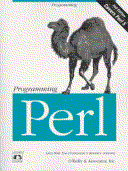 |
Programming Perl by
Larry Wall, Tom Christansen and Randall L. Schwartz. The standard
reference guide for all Perl programmers, from first principles to
more advanced topics. |
| The Perl Cookbook by
Tom Christiansen and Nathan Torkington. Hundreds of examples,
problems, solutions and tips that continue and extend the
foundations in the Camel book. |
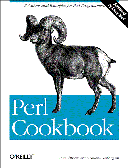 |
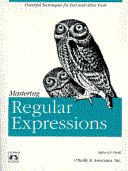 |
Mastering Regular
Expressions by Jeffrey Friedl. Everything you could possibly need
to know about regular expressions and the subtle differences and
additional features that are available in Perl, awk and 'standard'
(i.e. ed/sed) UNIX regular expressions. |
| sed and awk by Dale
Dougherty and Arnold Robbins. An extremely useful and comprehensive
guide to the basics and the more advanced use of these UNIX
filters, covering all of the standard variants. |
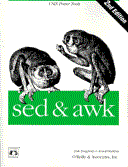 |
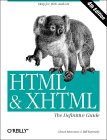 |
HTML and XHTML - The
Definitive Guide by Chuck Musciano and Bill Kennedy This is what
taught me HTML (the first edition 5? years ago covered Netscape 2
extensions :-) and has been well updated over time. Great
reference, though I was a little bit sick of Kumquats by the end of
it. |
| Dynamic HTML - The
Definitive Reference by Danny Goodman. I've not done a huge amount
of DHTML - lack of widespread browser support for most of the
really useful features being a key reason, but this gives excellent
coverage, and is worth the price for the fact that you get a
detailed reference of CSS/HTML/DHTML/DOM in the same book:
invaluable for cross-referencing. |
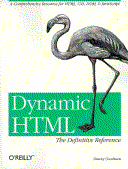 |
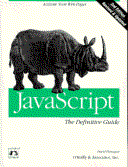 |
JavaScript - The
Definitive Guide by David Flanagan. Excellent coverage of the
language, how to support multiple versions and types of browsers
and how to hide all that sort of crud without ending up with a
lowest common denominator solution. |
| UNIX Systems
Programming for SVR4 by David A. Curry. An excellent general
reference to SVR4 programming, with mentions for all of the major
variants. Not quite as comprehensive as Stevens, but slightly
easier to carry around. |
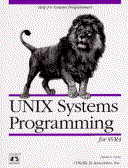 |
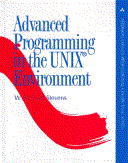 |
Advanced Programming
in the UNIX Environment by W. Richard Stevens. A weighty tome, but
worth the strain of lugging it around. If you're doing any amount
of semi-serious systems work, you can't afford to be without
this. |
| TCP/IP Illustrated Vol
1: The Protocols by W. Richard Stevens. Doing serious network
programming? Don't have this book? Get another job, cos you don't
know what you're doing. |
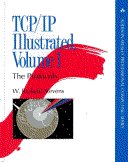 |



